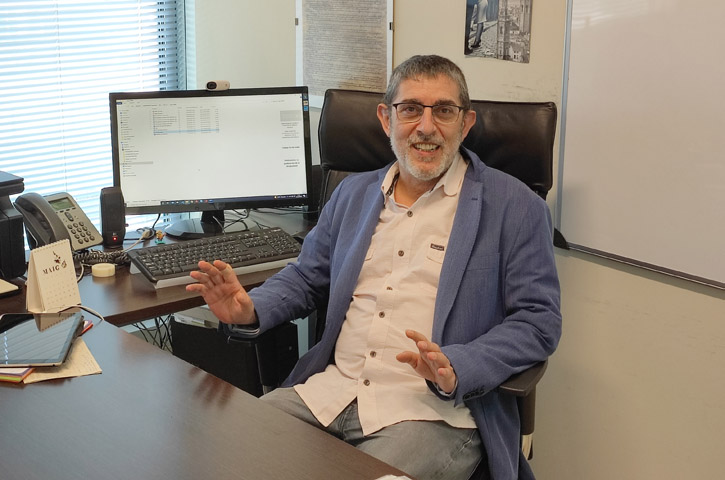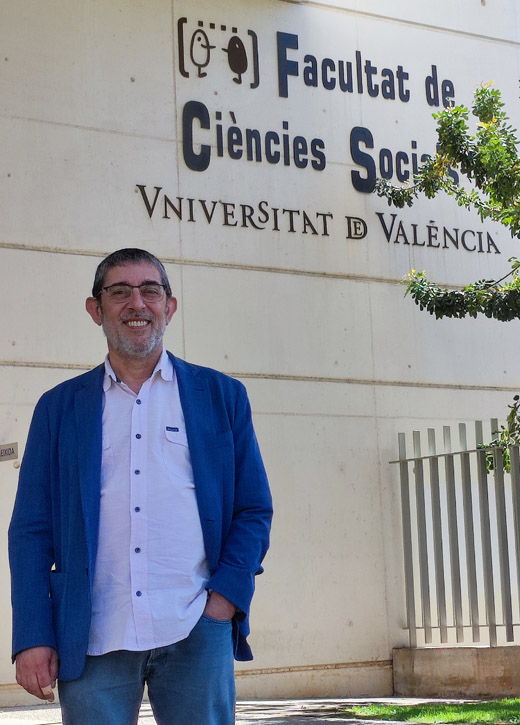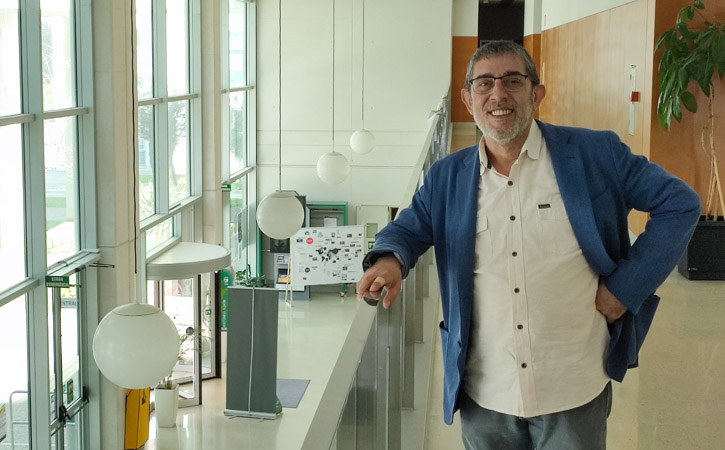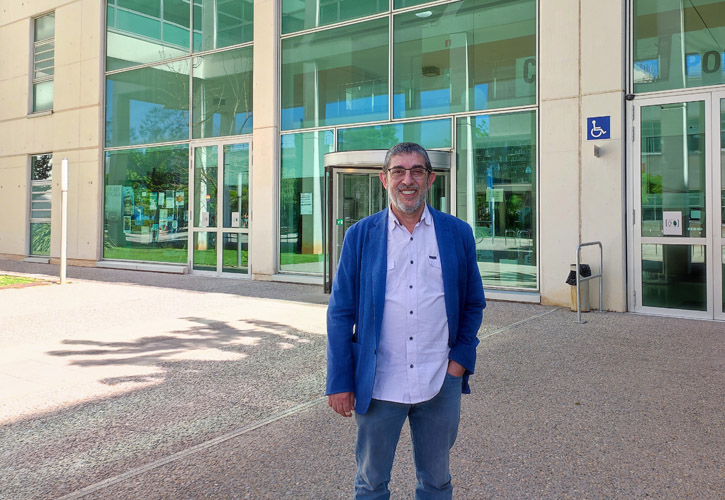Rafael Castelló: “If the middle class disappears or deteriorates, social life will be more conflictive and polarised”
- Scientific Culture and Innovation Unit
- June 2nd, 2022
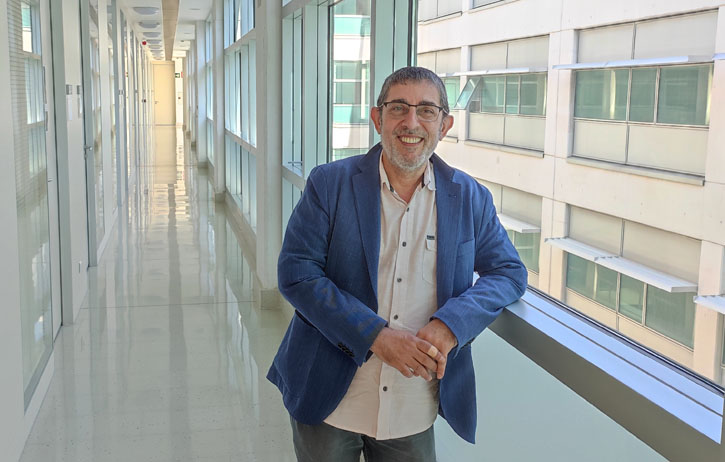
Rafael Castelló, professor at the Department of Sociology and Social Anthropology of the University of Valencia (UV), has dedicated part of his career as a researcher to demographic issues and political sociology in the Valencian context. In his latest book, Camins d’incertesa i frustració: les classes mitjanes valencianes (2004-2018) (‘Paths of uncertainty and frustration’) (Institució Alfons el Magnànim, 2022), he tries to present the Valencian middle class through an exhaustive analysis of social groups during the economic crisis and emphasises the incipient inequality, the lack of solidarity and the punishment of income from work.
1. What are the main causes that explain why the Valencian middle classes have worsened compared to the state average?
After investigating the subject, we observe that the Valencian middle classes are in worse conditions than the rest of Spain for two reasons: the worsening of workers’ salary conditions and the Valencian financing problem. The latter is understood from the relationship with the State, also acquires a significant impact on the middle classes. In terms of labour and capital income together, the Valencian middle classes are not worse off compared to the rest of Spain. Even capital income is very similar between territories. Thus, ultimately, the fundamental reason for inequality is the financing problem, the relationship with the State.
2. What inspired you to investigate and disseminate demography and political sociology in the Valencian area?
My concern for the future of this country and the influences of the staff of the Department of Sociology: Damià Mollà, who recruited me for the department, Josep Vicent Marqués or Rafael Ninyoles, who were department colleagues in my beginnings. This concern comes from the primary demand of Joan Fuster and from the need to reflect, think and investigate the specific reality of the Valencian Country. The concern for the Valencian Country and its society has been a personal guide during my professional career. For this reason, I have investigated its demography, the linguistic situation or national identities, as well as the class structure and inequality more recently.
“The Valencian middle classes are in a worse condition than in Spain due to the worse salary conditions of the workers and their financing problem”
3. Does this concern increase as the years go by?
I do not think that in my case there is a quantitative change that I am most concerned about now. However, as time goes by I notice that there are a number of problems that have not yet been resolved. The linguistic issue and the financing issue are obstacles that have been seen for a long time and still exist. Therefore, personal concern goes in the sense that time passes and problems are not solved. In my case, this is maintained because it is the point of view with which I look at the world, without going through the Spanish intermediary.
I think that in society there is a certain increase in concern, although not as much as I would like. We live in a political structure that has recognised and defined the Valencian collective existence, albeit in a weak way under the name of the Valencian Community. That has generated political-administrative realities that make people identify more as a member of a Valencian autonomous community, although fragmented identities such as the provincial ones are still reproduced.
4. Why is it important to know the history of the middle classes?
The middle classes are a social group that has been defined to interpose it between two extremes (upper/lower classes or business/proletariat) as a buffer against conflict and, therefore, as a modulator of collective life in such a way that coexistence is achieved. peaceful and little conflict. If the group disappears, deteriorates or loses position, it means that social life becomes more conflictive and even more polarised.
In fact, much of the polarisation observed in political life in recent years can be explained by the deterioration of the middle classes. To have a diagnosis of the situation of the middle classes is to have a diagnosis of the state of society as a whole, if a relational approach is taken. In the book, I don’t just talk about the middle classes, but about their relationship with the upper and lower classes. The middle class is the group on which peaceful coexistence has rested, it is the intermediary, and it is interested in a stable standard of living. In short, if the middle classes deteriorate, society enters a crisis.
5. How would you explain to citizens who do not know the Valencian context the situation of its middle classes?
The Valencian middle classes can be comparable to those of the rest of Spain. For example, in market relations they are comparable. If any citizen understands what a middle class is, s/he perfectly understands what a Valencian middle class is in terms of occupation, wages and income. There is a difference in how the State treats Valencian society as a whole. The Valencian middle class is mistreated as it is integrated into a society with a lower than average income level, which contributes more money than it receives and therefore is a poor community that pays richer territories.
This mistreatment has an impact on people’s living conditions because it means worse public services, less hiring of teachers and doctors, who are middle class. Thus, there is less access to worse services and fewer workplaces. All this makes the situation worse. If it were possible for the State not to mistreat the autonomous community in this sense, the middle classes would improve and would be comparable to the rest.
“The Valencian middle class is mistreated because it is integrated into an autonomous community with a lower than average income level”
6. How do the aging of the population, changes in the production structure or competition with emerging countries affect a society characterised by the European Social Model?
When we talk about the market model, the emerging countries compete with lower standards of living and are willing to receive lower salaries which, derived from the mobility of globalisation’s own capital, get investments mobilised. This means that people who negotiate wages have less bargaining power. On the other hand, it also affects welfare policies because the neoliberalism that has been hegemonic since the 1970s means a dismantling of the state, but at the same time it gives it a series of functions such as ensuring that the market works and helping capital move.
Thus, states compete with each other to attract investment. To achieve this, they must offer capital a series of tax and employment advantages that have a negative impact on the middle classes. The states have played with tax cuts that weaken them because they change the logic of social justice and generate fewer resources for public health, for example.
Regarding the aging of the population, if before people lived an average of 10 years and now they live 20 after retiring, it is obvious that the economic situation is not the same, since the people who are working are quantitatively few to maintain the people who have previously worked. The aging process of the population poses an important challenge to the Welfare State that we have to face.
7. What is the main objective of your book, Camins d’incertesa i frustració (‘Paths of uncertainty and frustration’)?
The initial objective was to provide evidence. It is not an opinion book, despite the fact that interpretative contributions of the results are made. My way of working has always been to have the information about it before giving an opinion. There was a lot of literature about the world, European and Spanish middle classes, but not about the Valencian case. It is also key to recover the tradition of this department based on concern about the situation in the Valencian Country and shed some light to explain what is happening and that can be used as a reflection on public policies. From a general vision, the objective was to obtain empirical evidence, carry out an analysis to better understand the situation and see if it could affect public policies made in the territory.
8. The book shows that the class structure depends on external factors such as gender, nationality or age. What influence does gender equality have on the study of the Valencian middle classes?
From the results of the investigation, I have deduced that the policies of redistribution and those of equality must go together. I came to the conclusion that gender equality is impacting the middle and upper classes, but not the lower ones. This result makes me reflect on redistributive policies for social classes and their relationship with equality policies.
If equality does not reach the lower classes, there are women who will have difficulty accessing intermediate positions. If the equality policy is not accompanied by redistributive policies based on the class structure, it will be difficult for it to reach all women. Being part of the middle classes is increasingly difficult because more wages and capital income are needed, that is, more income. If this happens, people, whether men or women, have difficulty moving up the social ladder.
“Gender equality is impacting the middle and upper classes, but not the lower ones”
---------------------------------------
“The aging process of the population poses an important challenge to the Welfare State that we have to face”
9. Families adapt their lives according to the social class to which they belong and, moreover, the middle class is progressively approaching the lower class and its way of life. As a result, do you consider the middle class an endangered species?
I would not define it that way because between two extremes you can always find an intermediate point. The problem lies in the internal divergence at that midpoint. I note that the middle classes can change their composition, that is, they will always exist, but their composition will be different. The problem arises when the middle class is stressed internally and how it manifests itself in the tension between the most affluent and the most precarious subgroups. In short, it is not so much that the middle classes disappear, but rather their functions.
We speak of middle classes, but without the functions they had. Among these functions, for example, having a high level of demand for market products because their living standards are falling, or as an intermediary between two extreme social classes. These functions, their precariousness and internal tension cause their social role to weaken.
10. How can the growing globalisation affect the process of attrition of the middle class?
Globalisation is related to the economic model. If investment is made in economic activities that provide little added value and are labour intensive, we are faced with jobs with low wages. This means that it opens up the possibility of competing in the international market in inferior conditions compared to economies that focus their activity on capital-intensive production. If profits are made from an economic model that is more labour-intensive than capital-intensive, part of those profits end up in the hands of entrepreneurs with capital-intensive investments, such as banking or technology companies.
These movements, in a global open economy, lead you to compete with people with lower wages and you enter a vicious circle, which also affects the policies of the State, which is forced to offer tax advantages to capital.
In any case, the crisis of 2008, the pandemic and the invasion of Ukraine are turning points in the processes of globalisation. From this globalisation without borders arise the groups of the extreme right, state nationalists and protectionists who make a deceitful speech in order to protect society. However, their goal is to protect the advantages of large companies. The alternative to this neoliberalism is to maintain a more respectful globalisation with the social structures of each place, with the peoples and with the environment.
11. In previous centuries, moving from one social stratum to another was a very complex task. Currently, how complicated is it to ascend from one social class to another throughout life?
In the last 30 years, there has been a certain tendency towards non-upward mobility and experimentation with a neo-feudal society, in that sense. When we talk about this concept, we refer to the impossibility that there was in feudalism for a vassal to become a noble.
During the period of the Thirty Glorious, after World War II, the State acquired redistributive functions, Keynesian policies and Fordism was implanted. The State, with its policies, facilitated significant social mobility: public education was developed, income was distributed, the power of unions and salary negotiations grew. These measures promoted an upward mobility in which the lower classes became the middle class and these, the upper classes.
When Fordism entered into crisis, the neoliberal discourse based on the minimal State, the market and competition gained space, but what the market has done has been to feed back processes in such a way that the poor are getting poorer and the rich, richer.
“Today, the University of Valencia is a benchmark in terms of language policy in the field of the Vives Network of Universities”
12. Looking to the future, how do you see the situation of the middle classes?
The data in the book is pre-pandemic, that is, it ends in 2018. Despite this, when I finished writing it, during the pandemic, I sensed that the middle classes were going to get worse because the activities affected were those with the greatest impact on the Valencian economic model: tourism, commerce and transport.
During COVID-19, these activities were very restricted. Still, with the war, prices are also skyrocketing. It is increasingly common for the middle classes to depend on a Welfare State capable of meeting their social and economic needs. In short, the future tendency of the Valencian middle classes will depend on the economic model designed, beyond construction and sun and beach tourism. And on the role of the Spanish state in the Valencian territory.
13. How important is the Welfare State in this conflict and how would you define it?
The Welfare State is solidarity, it is trust, it is looking at each other as if we were equals. In short, it is a way of approaching the management of what is public where a series of resources are put into play through which unexpected risks can be socially shared. A society that defines itself and establishes itself as such needs the Welfare State so that the sharing of any discomfort can make us all better off. And if the State that claims to be yours does not treat you as an equal (economically and culturally), then we have a big problem.
“The Welfare State is solidarity, it is trust, it is looking at each other as if we were equals”
14. How do you rate your time as director of the Language Policy Service of the UV?
It has been ten years as head under the direction of the vice-rector Isabel Vázquez quite positive. I value them with remarkable satisfaction, despite the fact that I am aware that things can always improve. Even so, seeing the context and the evolution of the Service, we must congratulate ourselves.
Today, the University of Valencia is a benchmark in terms of language policy in the field of the Vives Network of Universities, those centres for the study of the Catalan language. We are a benchmark because for 10 years we have progressively increased the teaching offer in Valencian, we have applied a plan and we have worked to comply with it. In the Valencian framework, we are the only university where the teaching offer in Valencian has grown significantly. We have also achieved, and we are the only Valencian university that does so, that the teaching staff who want an indefinite contract have to demonstrate their linguistic capacity in Valencian, which has translated into an improvement in the skills of the staff.



